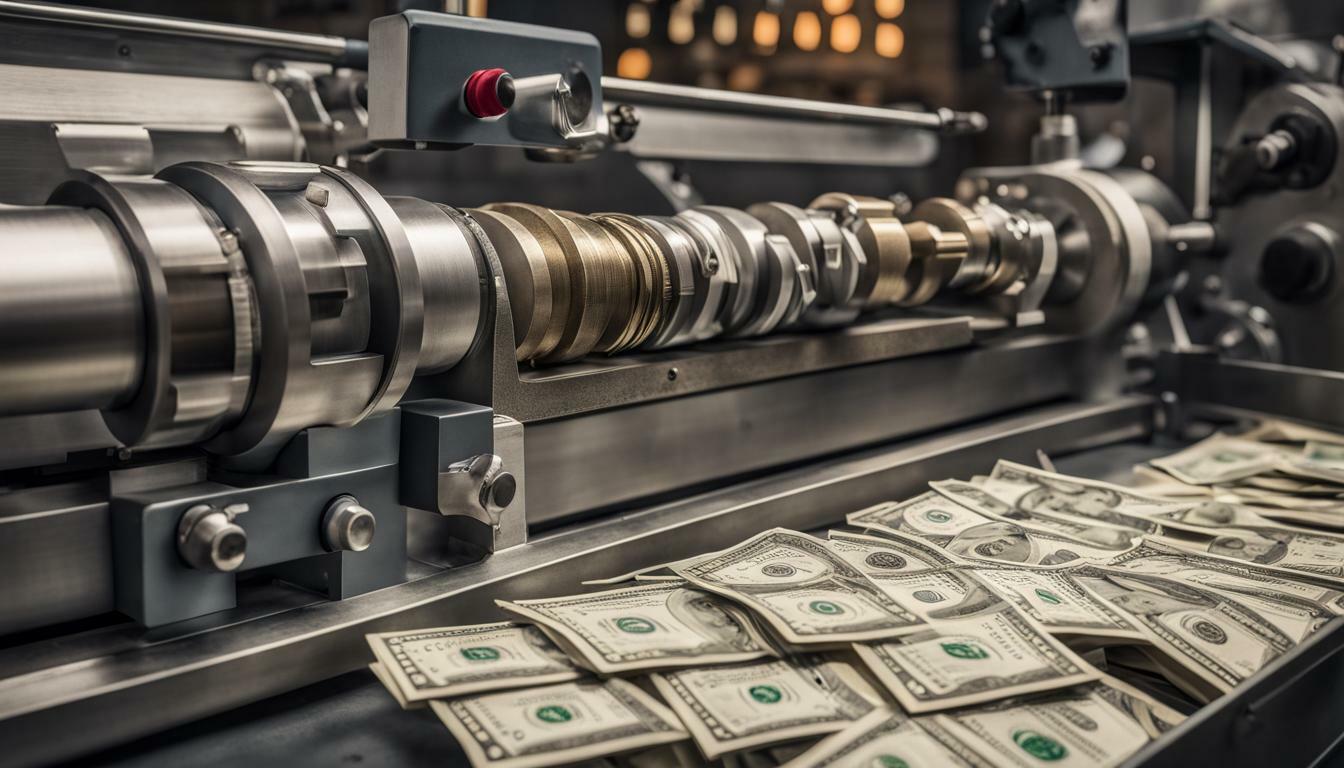
If you’re in the market for a lathe, you may be wondering how much you can expect to spend. The truth is, the price of a lathe can vary depending on several factors. In this article, we will explore the various considerations that impact the cost of lathes.
We’ll discuss the different types of lathes available, their features and capabilities, and how these impact their prices. Additionally, we’ll provide a breakdown of the price range you can expect for lathes, from entry-level models to high-end industrial lathes.
By the end of this article, you’ll have a better understanding of what you can expect to spend on a lathe and how to make an informed decision when comparing prices and features.
Key Takeaways:
- Lathe prices can vary depending on various factors such as size, power, and additional features.
- The cost of lathes ranges from affordable entry-level models to high-end industrial lathes.
- Understanding the factors that affect lathe pricing can help you make an informed purchasing decision.
Understanding Different Types of Lathes and Their Prices
If you’re looking to purchase a lathe, it’s important to consider the different types available and how their features and capabilities impact their costs. With so many options on the market, it can be overwhelming to decide on the right one for your needs and budget. In this section, we’ll explore the different types of lathes and provide some insight into their costs.
Entry-Level Lathes
Entry-level lathes are typically the most affordable options on the market. They are suitable for beginners who want to try their hand at woodworking or metalworking without breaking the bank. These lathes are smaller in size and have less power, but they can still produce satisfactory results. Entry-level lathes generally range from $150 to $500, making them a budget-friendly option for those just starting out.
Benchtop Lathes
Benchtop lathes are a step up from entry-level lathes and are suitable for more advanced users. They are larger in size and have more power, allowing them to handle more demanding projects. Benchtop lathes typically range from $500 to $2,000, depending on their size and features.
Industrial Lathes
Industrial lathes are the most advanced and expensive option on the market. They are designed for heavy-duty use in manufacturing settings and can handle large-scale projects. Industrial lathes range from $2,000 to $50,000 or more, depending on their size, precision, and additional features.
In addition to these types of lathes, there are also specialty lathes available, such as CNC lathes and wood lathes. These lathes often have higher price tags due to their specialized features and capabilities.
When considering the cost of a lathe, it’s important to keep in mind the features and capabilities that are most important to you. While an industrial lathe may offer the highest precision and power, it may not be necessary for your specific needs. Consider your budget and the types of projects you plan to undertake when making your decision.
Factors Affecting Lathe Prices
When considering purchasing a lathe, it’s crucial to understand the factors that affect its price. By doing so, you can make an informed decision that aligns with your requirements and budget. Here, we will explore the most significant factors that impact lathe prices.
Size
The size of a lathe has a significant effect on its cost. Generally, larger lathes with longer beds and greater swing capacities tend to be more expensive. If you require a lathe for smaller projects, a mini-lathe may be a budget-friendly option.
Power
The horsepower of a lathe’s motor also influences its price. Lathes with higher horsepower are typically more expensive but offer greater capacity for heavy-duty projects. If you require a lathe for lighter work, a lower horsepower lathe may suffice.
Precision
The level of precision a lathe offers is another crucial factor that influences its price. Lathes with greater precision and accuracy in their machining tend to be more expensive due to the higher quality of components required.
Additional Features
Additional features such as digital readouts, variable speed control, and multiple chuck capacities can significantly impact the price of a lathe. Consider which features are essential for your projects and weigh the cost-benefit of investing in them.
Lathe Pricing Guide
When comparing lathe prices, it’s essential to consider all of these factors to determine the true value of each option. A lathe with a lower price tag may seem like a great deal initially, but it may not have the necessary features and functionality to meet your requirements.
Lathe Price Comparison
Comparing the prices of various lathes can seem overwhelming, but with a clear understanding of the factors that affect pricing, you can make an informed decision. Consider creating a list of must-have features and functions and comparing prices for lathes that meet those criteria.
Exploring the Price Range of Lathes
When it comes to purchasing a lathe, there is a wide range of prices depending on the type and model you choose. Entry-level lathes can cost as little as a few hundred dollars, while industrial-grade models can run into tens of thousands of dollars.
If you’re on a tight budget, don’t worry – there are still affordable options available. You can find budget-friendly lathes that offer decent features and capabilities without breaking the bank. These lathes typically cost between $500 and $2,000, depending on the type and size.
If you want the best value for your money, it’s important to consider the features and capabilities that are most important to you. Look for lathes that offer a good balance of price, performance, and durability. The best value lathe for you will depend on your specific needs, but you can typically find good options in the $1,000 to $5,000 range.
| Lathe Type | Price Range |
|---|---|
| Entry-level lathes | $200 – $500 |
| Benchtop lathes | $500 – $2,000 |
| Mid-range lathes | $2,000 – $5,000 |
| High-end industrial lathes | $10,000 – $50,000 |
It’s also worth mentioning that price isn’t the only factor to consider when choosing a lathe. You should also consider the quality and support offered by the manufacturer, as well as the long-term reliability and performance of the machine. By weighing all of these factors, you can make an informed decision and find the lathe that best fits your needs and budget.
Assessing Value and Quality in Lathe Pricing
When evaluating the cost of a lathe, it’s important to consider its overall value and quality. While a lower-priced lathe may seem like a great deal, it may not offer the durability, precision, or features you need for your projects. On the other hand, a high-end lathe may be packed with advanced features, but it may not be necessary for your specific needs.
To find the best value lathe, you should consider both the initial cost and the long-term benefits of your investment. Look for a lathe that offers a balance of affordability, quality construction, and versatile features. Keep in mind that a durable and reliable lathe will save you money in the long run by reducing repair costs and downtime.
Additionally, research the manufacturer and read reviews from other customers to assess their reputation for quality and customer support. A manufacturer that offers strong customer service and support can provide peace of mind and assurance for your purchase.
When selecting a lathe, remember that the cheapest option may not offer the best value in the long run. Consider spending a little extra on a durable and reliable lathe that will provide a high-quality performance and last for years to come.
Conclusion
After exploring the various factors that affect the pricing of lathes, it is clear that the cost of a lathe varies widely depending on its size, power, precision, and additional features. It is important to consider all of these aspects when comparing prices in order to make an informed decision.
Understanding the different types of lathes available and their corresponding price ranges is also key to finding the best value for your budget. Whether you are looking for an affordable lathe for personal use or a high-end industrial lathe for commercial applications, there are options available for every price range.
Ultimately, when assessing the value and quality of a lathe based on its price, it is important to consider not only the initial cost, but also the long-term durability, performance, and support offered by the manufacturer. By doing so, you can ensure that you are investing in a lathe that meets your requirements and provides a solid return on investment.
FAQ
Q: How much does a lathe cost?
A: The cost of a lathe can vary greatly depending on factors such as size, power, precision, and additional features. Entry-level lathes can start as low as a few hundred dollars, while high-end industrial lathes can cost tens of thousands of dollars.
Q: What types of lathes are available and how do their prices differ?
A: There are various types of lathes available, including benchtop lathes, mini lathes, wood lathes, metal lathes, and CNC lathes. The prices of these lathes vary based on their size, capabilities, and build quality. Budget-friendly options are available for those with limited resources.
Q: What factors affect lathe prices?
A: Several factors can influence the price of a lathe. These include the size of the lathe, its power and precision capabilities, and any additional features it may have, such as digital readouts or variable speed control. Higher-end lathes with more advanced features tend to have higher price tags.
Q: What is the price range for lathes?
A: The price range for lathes can vary widely. Entry-level models can be found in the range of a few hundred dollars, while professional-grade lathes can cost several thousand dollars. Industrial lathes used in large-scale manufacturing can have price tags in the tens of thousands of dollars.
Q: How do I assess the value and quality of a lathe based on its price?
A: When considering the price of a lathe, it is important to look beyond just the initial cost. Consider factors such as the long-term durability of the machine, its overall performance, and the level of support offered by the manufacturer. A higher-quality lathe may have a higher upfront cost but can provide better value and longevity in the long run.
- Delta Midi Lathe 46-250 Performance - August 27, 2023
- Understanding the Different Parts of a Lathe Machine - August 27, 2023
- Explore Different Lathe Tool Holder Types for Your Projects - August 27, 2023
